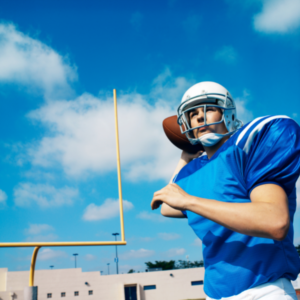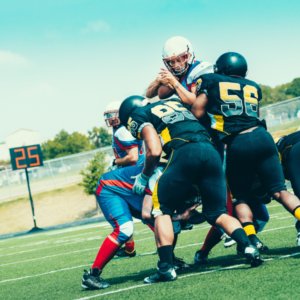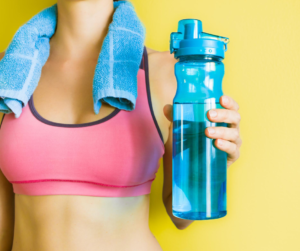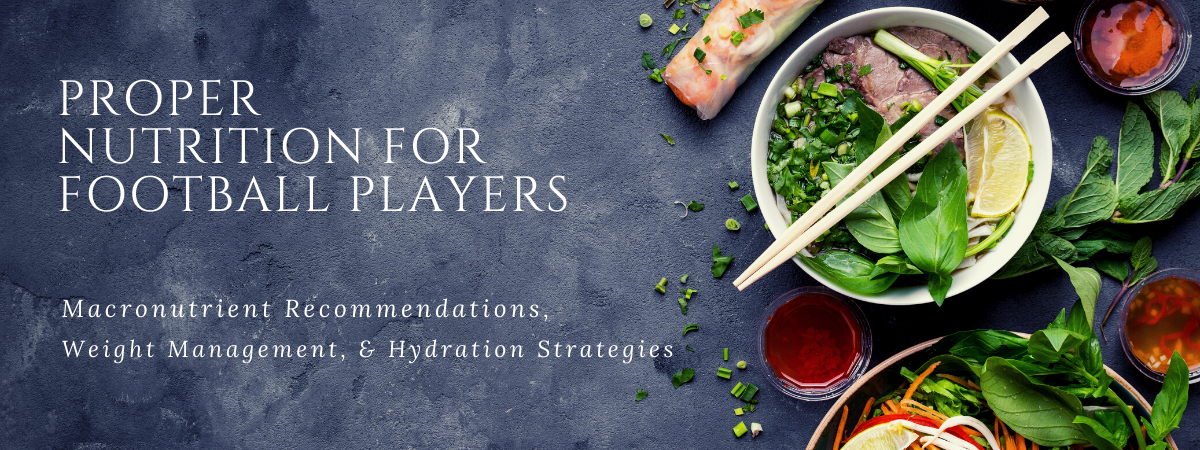Macronutrients, Weight Management, and Hydration Strategies for Football Players
How many of you have ever been in the middle of practice or a game and found yourself dragging and feeling fatigued? Or maybe you have a family member or friend who has experienced this? Well, picture this – tie game, fourth quarter, and down to the final 3 minutes. This is when it really counts and you need to be your best. But how are you expected to perform your best when you hit a wall two quarters ago and feel sluggish, tired, and less alert? Just as we need to train like a champion, we need to eat like a champion too!
Why Proper Nutrition Is Important for Athletes
For youth, high school, collegiate, and professional athletes alike, proper nutrition is pivotal for supplying energy, optimizing speed, power, strength, and agility, building muscle, and supporting recovery from grueling workouts, practices, and games. In general, football is an intermittent high-intensity sport, so the body relies heavily on carbohydrates for energy. Therefore, this should be your pregame or pre-practice focus to prevent early-onset fatigue. Although athletes will only experience roughly 40-60 minutes of actual activity during a typical football game (depending the level), games can take up to 4 hours to complete when you account for half-time, frequent timeouts, and stopping the clock between plays. As a result, you should make sure to eat a well-balanced pre-game meal and fuel as needed throughout the game to perform your best. Keep in mind that no two athletes are the same (i.e. age, body composition, height, weight, position on the field, playing time, specific goals, level of training), and energy and macronutrient needs will vary from season to season (i.e. pre-season, championship season, post-season, off-season). Hence, taking an individualized versus a “one size fits all” approach to nutrition is key.
Macronutrient Recommendations: Carbohydrates, Protein, and Fat
 Protein serves as a building block for muscle mass and supports recovery from strenuous exercise. However, the amount, timing, and quality of protein can optimize these benefits. The recommended intake for football players is 1.3-1.8 g/kg, but needs can be as high as 2.4 g/kg for individuals trying to lose body fat while maintaining lean body mass. Consuming 0.25-0.40 g/kg (i.e. 23-36 g for a 200lb wide receiver) of lean protein within 1 hour of vigorous strength or power training and every 3-4 hours can promote muscle protein synthesis. Research shows that exceeding this amount will not promote further benefits and will ultimately be oxidized by the body. The focus should be on high-quality lean protein sources such as lean beef and pork, skinless poultry, fish, eggs, and low-fat dairy products. Plant proteins such as beans, lentils, chickpeas, quinoa, soy, nuts, and nut butter can be incorporated as well.
Protein serves as a building block for muscle mass and supports recovery from strenuous exercise. However, the amount, timing, and quality of protein can optimize these benefits. The recommended intake for football players is 1.3-1.8 g/kg, but needs can be as high as 2.4 g/kg for individuals trying to lose body fat while maintaining lean body mass. Consuming 0.25-0.40 g/kg (i.e. 23-36 g for a 200lb wide receiver) of lean protein within 1 hour of vigorous strength or power training and every 3-4 hours can promote muscle protein synthesis. Research shows that exceeding this amount will not promote further benefits and will ultimately be oxidized by the body. The focus should be on high-quality lean protein sources such as lean beef and pork, skinless poultry, fish, eggs, and low-fat dairy products. Plant proteins such as beans, lentils, chickpeas, quinoa, soy, nuts, and nut butter can be incorporated as well.
In terms of fat intake, there are no specific recommendations for football players. However, an emphasis should be placed on heart-healthy fats, specifically omega-3s, to reduce the risk of heart disease and decrease inflammation. Examples include tuna, salmon, mackerel, seeds (flaxseeds, chia seeds), nuts (walnuts, almonds, pecans, pistachios), avocado, and vegetable oils (olive, canola).
Weight Management
 This is a very common scenario, especially in collegiate football, where an athlete may be told they need to meet a specific weight goal in order to excel on the field. This is typically done by consuming a caloric surplus for weight gain, and a caloric deficit for weight loss. However, when not executed in a healthy manner (i.e. gaining or losing greater than 1% body weight per week), either weight management strategy could do more harm than good. Any intentional change in weight or body composition should be the focus during the off-season while optimizing performance should be prioritized during the regular season.
This is a very common scenario, especially in collegiate football, where an athlete may be told they need to meet a specific weight goal in order to excel on the field. This is typically done by consuming a caloric surplus for weight gain, and a caloric deficit for weight loss. However, when not executed in a healthy manner (i.e. gaining or losing greater than 1% body weight per week), either weight management strategy could do more harm than good. Any intentional change in weight or body composition should be the focus during the off-season while optimizing performance should be prioritized during the regular season.
For weight gain, the focus should be on frequent fueling, increasing portion sizes of carbohydrates and/or fats at meals while keeping protein consistent, and following a structured strength training program to increase lean muscle mass, which can improve speed and power, and mitigate increases in body fat mass, which can hinder performance and increase the risk of chronic disease. A good rule of thumb is packing lots of energy into a small bite to prevent digestive distress and feeling overly full (more calories, less volume).
For weight loss, the focus should be on consuming a well-balanced diet consisting of lean protein, fiber-rich complex carbohydrates, low-fat dairy products, heart-healthy fats, and plenty of fruits and vegetables while limiting refined carbohydrates and sweets. Protein intake should be a primary focus and may be slightly higher (2.3 g/kg) to maintain lean body mass during short-term caloric restriction. Carbohydrate intake should be adequate to support the current activity level, and the remaining caloric intake should be composed of dietary fat with an emphasis on monounsaturated and polyunsaturated fats.
Hydration Strategies

Proper hydration is incredibly important for football players, especially in hot, humid environments or during grueling two-a-day workouts. Performance will start to decline with as little as a 2-3% loss in body weight from sweat. Therefore, it is important to weigh yourself before and after practice to assess water loss so you can properly rehydrate. You should drink at least 16 oz of fluid 2-3 hours before workouts, practice, or a game, plus an additional 8 oz 15 minutes before. During activity, try to drink 4 oz every 15-20 minutes. Following activity, consume 16 oz of fluid for every pound lost. Keep in mind that electrolytes such as sodium, potassium, and magnesium are also lost in sweat which can cause muscle cramping and derail performance. During prolonged intense exercise (longer than 60 minutes), it is important to replenish these electrolytes by consuming a sports drink or mixing electrolyte powder with water.
Sydney Anderson
MS RDN CPT
References:
Heaton LE, Davis JK, Rawson ES, et al. Selected In-Season Nutritional Strategies to Enhance Recovery for Team Sport Athletes: A Practical Overview. Sports Medicine. 2017;47(11):2201-2218. doi:10.1007/s40279-017-0759-2
Karpinski C, Rosenbloom C, And N. Sports Nutrition: A Handbook for Professionals. Academy Of Nutrition And Dietetics; 2017.
Kerksick CM, Arent S, Schoenfeld BJ, et al. International society of sports nutrition position stand: nutrient timing. J Int Soc Sports Nutr. 2017;14:33. Published 2017 Aug 29. doi:10.1186/s12970-017-0189-4
SSE #146 Fueling a Football Team. Gatorade Sports Science Institute. Accessed November 29, 2021. https://www.gssiweb.org/en-ca/article/sse-146-fueling-a-football-team


